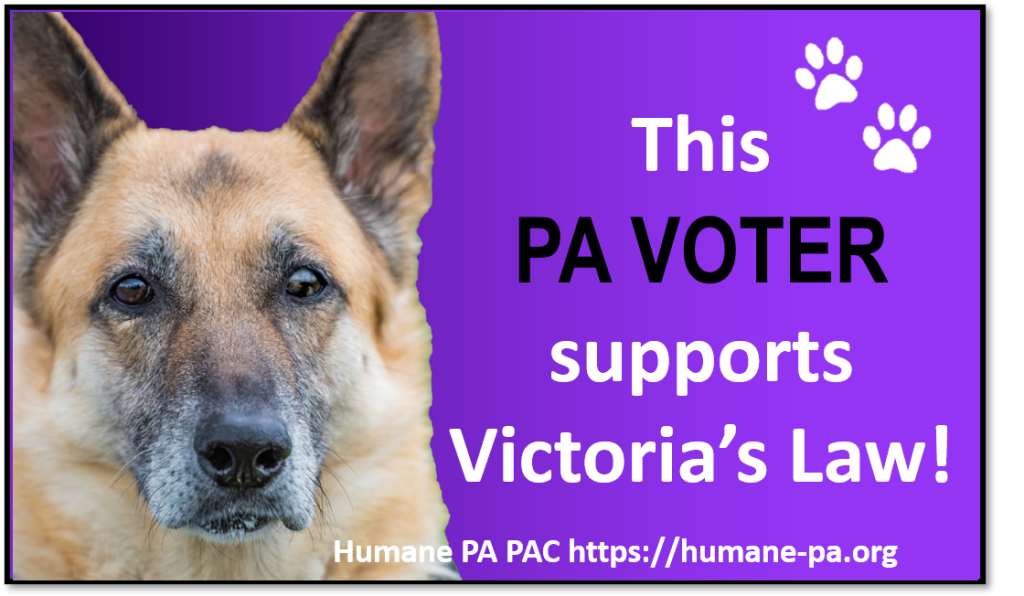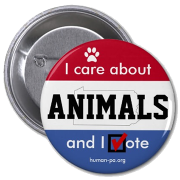This bill was from the 2021/22 Session
SB 234 (Victoria’s Law) was introduced by Senators Kristen Phillips Hill and Lisa Boscola. A mirror house bill has also been introduced by Representatives Tracy Pennycuick and Jeanne McNeill HB1299 (Victoria’s Law)!
Victoria’s Law will drive the pet market in PA towards more humane sources by prohibiting the sale of commercially-raised dogs, cats and rabbits in pet stores, and increase transparency by requiring sellers to include identifying information.
HOW YOU CAN HELP: Ask your state senator to support SB 234 and your state representative to support HB 1299!
Additional Facts:
Victoria’s Law will promote animal welfare and adoption.
- It is well-documented that puppy mills (inhumane commercial breeding facilities that disregard the well-being of dogs for profit) supply pet stores with puppies; Pennsylvania pet stores are no exception.
- Cutting off the puppy mill to pet store supply chain will decrease the demand for puppies raised in puppy mills considered shocking, appalling, and unacceptable by the majority of Pennsylvanians.
- This bill will help shift the pet market towards humane sources, including shelters and rescues that are burdened with finding families for homeless pets, thousands of whom are euthanized each year in Pennsylvania alone.
- Responsible breeders, who care deeply for their dogs, will continue to provide Pennsylvanians with healthy, socialized dogs. These breeders will not be impacted by this bill because they do not sell to pet stores, as their breed clubs discourage it and demand to meet buyers in person.
Victoria’s Law will protect Pennsylvania consumers from a flawed sales model.
- Consumers often spend thousands of dollars caring for sick pet store puppies, in some cases, only to suffer the heartbreak of their new pet dying.
- Consumers often end up with behaviorally challenged puppies who were not properly socialized by the mill nor the pet store, and struggle to transition from life in a cage to life in a family.
- The CDC has linked contact with pet store puppies to an outbreak of an antibiotic resistant strain of Campylobacter that has infected 118 people in 17 states, including 6 in PA, causing 26 of them to be hospitalized. This is likely the result of pet stores pumping sick puppies with antibiotics to appear healthy to consumers.
Victoria’s Law is business friendly.
- Stores that sell commercially raised puppies operate based on an outdated and socially unacceptable business model, and are an outlier in their own industry.
- The huge majority of pet stores, including the largest and most successful chains and small mom and pop shops, do not sell puppies, proving that pet stores do not need to sell puppies to be successful.
- Owners of Pet Food Express stores in CA and Bark! stores in MD vocally supported similar bills in those states, telling legislators that focusing on products and services and partnering with shelters and rescues was the responsible thing to do and also the key to running a successful pet store.
Victoria’s Law will codify into state law ordinances passed by Philadelphia and Pittsburgh.
- Philadelphia and Pittsburgh unanimously passed ordinances prohibiting the sale of dogs and cats in pet shops, unless obtained from a shelter or rescue. The Pittsburgh law includes advertising language similar to this bill.
- 290 localities in the U.S., as well as the state of California and Maryland, have passed similar laws.
Federal and state laws do not adequately protect animals or consumers.
- Pennsylvania law currently does not regulate where pet stores source puppies and does little to protect consumers beyond requiring meager reimbursement for sick puppies.
- Federally licensed breeders face minimal USDA regulation. Standards of care are shockingly low, allowing breeding dogs to spend their entire lives in filthy wire cages only 6 inches larger than the dog; and enforcement is severely lacking, according to the USDA itself. Contrary to pet store rhetoric, a USDA license does not disqualify a facility from being a puppy mill.
- The USDA is redacting all pertinent information from animal welfare inspection reports posted on their website and available via public records requests. It is considering allowing third party inspections of commercial breeders, which would likely result in a self-regulated puppy mill industry.
Victoria’s Law will provide transparency in advertising.
- Both licensed and unlicensed puppy mills rely on deceptive advertising to sell puppies because they know if their description of their facility and photos were accurate no one would buy from them.
- By requiring those with federal, state and/or local licenses to include that license number(s) in all advertisements, as well and their name and address, consumers will be able to research licensed kennels and be alerted to unlicensed ones.
- Requiring identifying information in advertisements will also give enforcement officers an opportunity to identify unlicensed breeders and offer an extra incentive for breeders to comply with the law.
- In 2009, the Pennsylvania court shut down a puppy mill after the owners, who previously settled the state’s largest-ever consumer fraud case for selling sick dogs to more than 171 customers, failed to comply with a court order over 800 times that required them to identify themselves in advertisements. At the time, the couple held a Dog Law kennel license allowing them to house over 500 dogs.
Victoria’s story.
Victoria was a German Shepherd who was rescued from a Pennsylvania puppy mill after 10 years of breeding. She became completely paralyzed as a result of a genetic, neurological disorder called Degenerative Myelopathy, a disease she passed down to the estimated 150-200 puppies she produced while at the puppy mill and attached is her photo. When puppy mills no longer have pet stores to supply their puppies to, far less dogs will be forced to endure what Victoria did.


